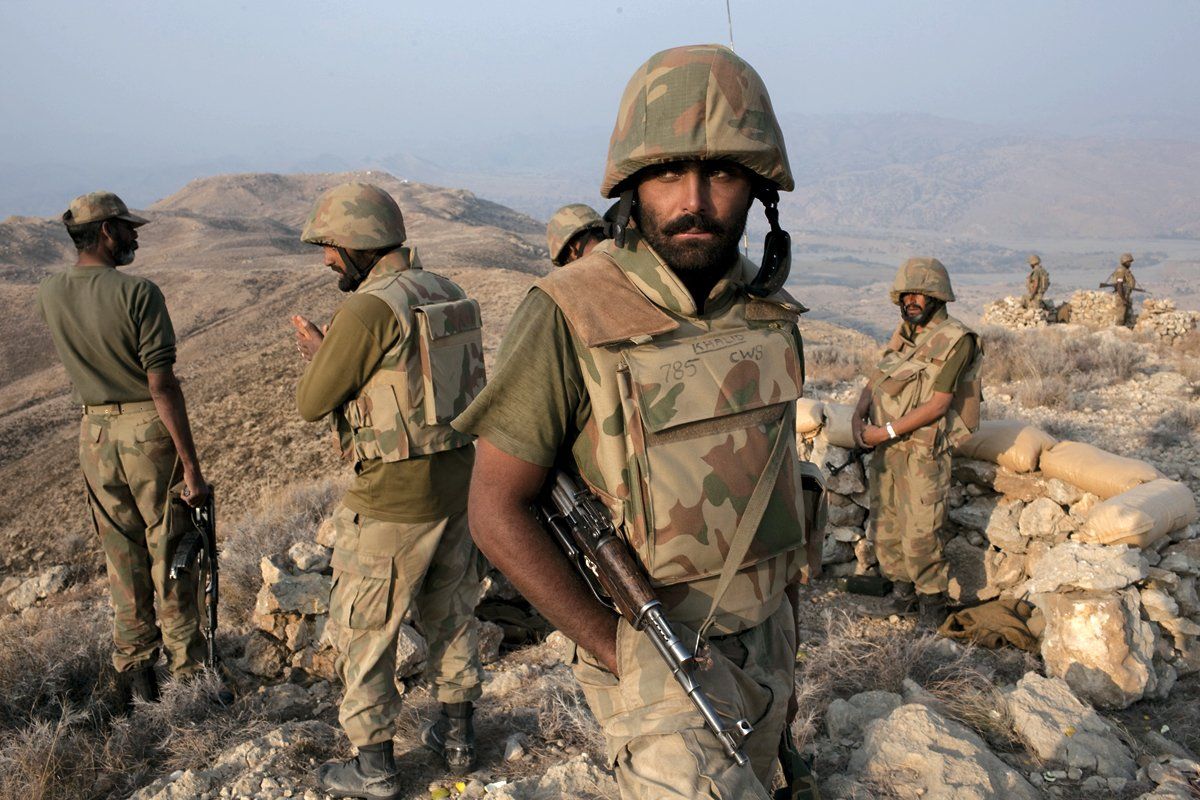
Deep among North Waziristan's mountains, far from any village, Hafiz Hanif finally tracked down the remnants of his old al Qaeda cell last summer. The 17-year-old Afghan had wondered why he hadn't heard from his former comrades in arms. They didn't even answer his text messages in May, after the death of the man they all called simply the Sheik: Osama bin Laden. Now Hanif saw why. Only four of the cell's 15 fighters were left, huddled in a two-room mud-brick house, with little or no money or food. Except for their familiar but haggard faces, they looked nothing like the al Qaeda he once trained with and fought beside. They welcomed him warmly but didn't encourage him to stay. They said the cell's commander, a Kuwaiti named Sheik Attiya Ayatullah, had gone into hiding. The others had either run off or died. "Why should we call you back just to get killed in a drone attack?" Hanif's friends explained.
Is it still too soon to write al Qaeda's obituary? Over the past two years, the group's ranks have been ravaged by America's unmanned-aerial-vehicle attacks and by a steady exodus of demoralized jihadis fleeing Pakistan's tribal areas. When Newsweek interviewed Hanif (his nom de guerre) for our Sept. 13, 2010, cover story, "Inside Al Qaeda," he estimated that the group had roughly 130 Arabs in Waziristan, along with dozens more Chechens, Turks, Tajiks, even recruits from Western Europe. But little more than a year later, he estimates there are no more than 40 to 60 al Qaeda operatives of any nationality on either side of the border. "Al Qaeda was once full of great jihadis, but no one is active and planning opera-tions anymore," he complains. "Those who remain are just trying to survive."
The son of longtime Afghan war refugees living in Pakistan, Hanif had just turned 15 when (against his parents' strenuous objections) he ran away to join the war against the U.S. forces in his home country. That was in early 2009, and for the next year and more, the bright but impressionable boy lived among al Qaeda fighters in the isolated wilds of North Waziristan. His parents finally persuaded him to return home in June 2010, but he headed out again this past June in hope of reconnecting with his old unit. He was shocked by what he found. "The flower is wilting," he told a Newsweekcorrespondent who met with him in December in a Taliban safe house near the Afghan town of Khost. "I think the once-glorious chapter of al Qaeda is being closed."
Few Americans share Hanif's regret at the terrorist group's decline. But by all accounts, al Qaeda has been practically wiped out in its former Afghan and Pakistani strongholds. Although America has suspended its drone attacks inside Pakistan since mid-November—the program's longest hiatus in three years—the respite seems to have come too late for bin Laden's old associates. "The drone attacks may have ended, but only after the near ending of al Qaeda in the tribal areas," says a senior Taliban intelligence officer who has been in contact with surviving members of the group. "As far as I can tell, the operational command of al Qaeda has almost been eliminated." Hanif's uncle, a Taliban operative, tells Newsweek he's been in contact with a few al Qaeda members who have taken refuge outside the tribal areas. "All of al Qaeda's assets who had a strategic vision have been eliminated," they've told him.
Hanif says it's been months since anyone in Waziristan has seen or heard directly from bin Laden's successor, Ayman al-Zawahiri. The Egyptian-born physician did post a video message on Dec. 1 boasting that al Qaeda had seized aid worker Warren Weinstein, a 70-year-old American, in Lahore—as if holding one old man hostage was an achievement. "I think the martyrdom of our great Sheik was the end," Hanif says. "As long as the Sheik was alive, our leaders were strong and were determined to fight. But his death and the drones have sucked the blood out of our leadership. Now leaders seem to spend all their time moving from one place to another for their safety." Lying low didn't save Sheik Ayatullah; the drones got him soon after Hanif's return to Waziristan.
New recruits have stopped coming, Hanif says. "When new people came they brought new blood, enthusiasm, and money. All that has been lost." The money may be a bigger problem than the manpower, he says. Al Qaeda used to receive millions of dollars a year from Arabian Gulf contributors, but Hanif's uncle says his contacts tell him the donations have dried up. Instead, he believes, the money is going to the more productive and generally nonviolent Arab Spring movements in North Africa, Syria, and Yemen. "I think Arab people now think the fight should be political at home and not terrorism aimed at the West," says the uncle. "The peaceful struggle on Arab streets has accomplished more than bin Laden and Zawahiri ever have."

Hanif recalls how al Qaeda logistics operatives used to visit his unit to ask what the men needed in terms of weapons, medicine, food, and money. And he used to love making supply runs to the bazaar in North Waziristan's capital, Miran Shah, with pockets full of cash for sweets and tea and to use the Internet. The town is still thronged with Pakistani and Afghan Taliban, shopping side by side with Pakistani soldiers, but now the Arabs have mostly vanished, and the shops specializing in olive oil, Arabian dates, and other Arab favorites are deserted or closed. Fighters subsist on minimal rations—if they aren't left to fend for them-selves. That's not easy, since al Qaeda has few friends in the area. Villagers fear that bin Laden's men could bring drone strikes and the danger of civilian casualties, and al Qaeda has nothing left to offer local militants. The group is broke, and most of its best explosives and technical specialists have either died or left the vicinity. There aren't even enough fighters left to act as reinforcements.
Still determined to rejoin the jihad, Hanif enlisted in the Taliban-allied Pashtun army led by Sirajuddin Haqqani. Ever fearful of the drones, the network's top commander keeps a low profile these days, says Hanif. When traveling, Haqqani covers his face with a scarf that hides all but his eyes. (Most of his lieutenants and bodyguards do the same.) Although he and his men fit into tribal life in a way that al Qaeda's Arabs never could, the Haqqani leadership takes no chances, evidently convinced that the region is rife with locals in the pay of the CIA. As a result, Haqqani employs a brutal and feared hit squad of masked men called the Khurasan force, which has murdered, and in many cases beheaded, scores of suspected spies.
Hanif says he spent the next five months with the Haqqanis and took part in several cross-border raids into Afghanistan—"picnics," his fellow fighters called them. "We'd cross the border on operations of one, two, or three days; make short, sharp attacks; and then return," he says. "Crossing into Afghanistan is easier than ever. There's no one to stop us." When Haqqani fighters run into Pakistani troops, they just keep going, Hanif says; they're never challenged. "I think there's an understanding," he says.
He says the network's fighters are brave, but they're not as disciplined and pious as al Qaeda fighters were. "Fifty percent of these young mujahedin are looking for something to do," Hanif says. "They're not really fighting for Islam." Even so, he likes their fighting spirit. "They may be careless and not religiously motivated, but they are good jihadis."
He isn't sure what he'll do next. At present he's taking time off from the war, staying with relatives in Afghan-istan. He says he's still determined to rid Afghanistan of Americans and foreign influence and to reestablish Mullah Mohammed Omar's Islamic Emirate, although he's disappointed that al Qaeda can no longer help him achieve those goals. He stays in touch with his parents by phone, and they keep urging him to return home to Ka-rachi, get married, and perhaps go into business. Hanif hates the idea. To do so, he says, would be a betrayal of his political and religious beliefs. Still, he says, he's thinking of going home—just for a little while.
Uncommon Knowledge
Newsweek is committed to challenging conventional wisdom and finding connections in the search for common ground.
Newsweek is committed to challenging conventional wisdom and finding connections in the search for common ground.





